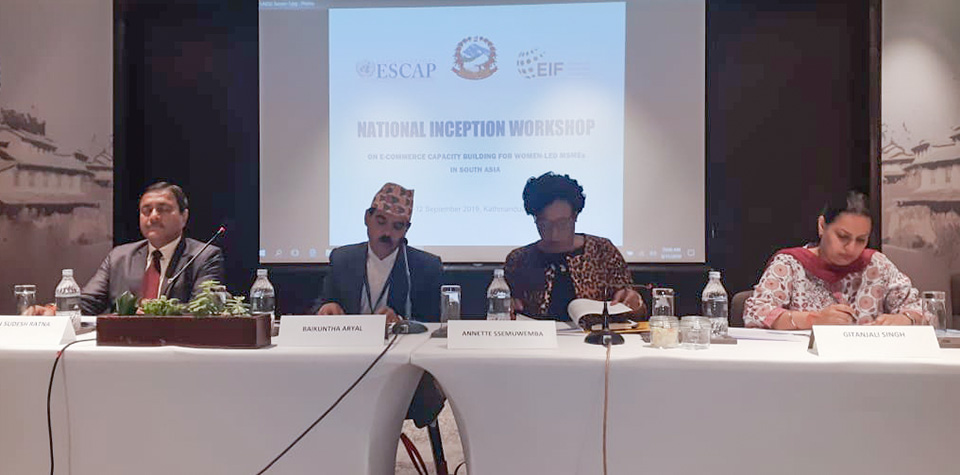Remarks by UN Women Deputy Representative, Gitanjali Singh at the National Inception Workshop on E-commerce Capacity Building for Women-led MSMEs in South Asia, Kathmandu
Date:
[As delivered]

Honourable Secretary Dr. Aryal, distinguished guests, ladies and gentlemen,
Good morning and namaste.
I am very pleased to be here this morning representing the UN Resident Coordinator Ms. Valerie Julliand.
Gender equality and women’s empowerment is at the heart of what we, as the UN, work towards. This is especially true with the ongoing efforts to achieve Agenda 2030 for Sustainable Development and our promise to leave no one behind.
I would like to thank UN ESCAP for its tireless work in creating opportunities for women entrepreneurs by fostering gender-responsive business environments and connecting women innovators, entrepreneurs and investors with policymakers around e-commerce.
Let me start with the story behind Alibaba. Its CEO Jack Ma who is to step down next week was inspired to start his massive business by the demand of a few women who reached out to him on the Internet and asked how they could market some goods they were producing on a small scale. In 2017, Jack Ma had proudly declared that Alibaba was an example of women's economic empowerment through E-commerce as 40 per cent of its management and 60 per cent of its employees were women and its suppliers and customer base also reflected gender balance!
The ever-expanding markets require women to participate both as business owners and consumers, and profit equally with men. In the evolving context of global trade and commerce with accelerating technological advancement it is our responsibility to draw timely attention to women’s limited access to technology and the gender gap in digital literacy, which keeps women from realising their economic potential.
Women’s equal access to E-commerce is not only a door of opportunity for women’s economic empowerment, but also research has shown that money in the hands of women is spent on health, education—the family—benefiting the community and economy. It gives women flexibility and enhances their decision-making power in homes. Digital financial solutions also have dramatic impacts on women’s economic and social well-being, especially when women are subject to various mobility restrictions due to gender discriminatory social norms. E-commerce is an accelerator for the achievement of the SDGs as highlighted by previous speakers.
Yet, we must be careful that E-commerce does not end up reinforcing traditional gender roles and stereotypes within the household. We must ensure that we do not keep women at home nor increase their burden of work, including unpaid domestic and care work.
The UN High-Level Panel on Women’s’ Economic Empowerment recommended that countries assess how women are progressing along the digital inclusion continuum and enable women’s voice to shape policies as well as digital and financial products and services. Gender responsive laws, policies and regulations can support digital inclusion of women in E-commerce while addressing security and privacy concerns. Access to financing, business development and training must be coupled with infrastructural development of broadband services to improve access, affordability and adoption of e-commerce by women.
Transforming economies to achieve substantive equality requires the meaningful participation and leadership of women in Nepal and the region. It is difficult to win any game with half the team sitting on the bench. Investing in women’s economic empowerment is not only the right thing, but also the smart thing to do.
I am hopeful that women entrepreneurs who are here today, and the innovative businesses you have developed, can lead the way in breaking barriers for other women in the region to move from the margins to the centre of sustainable economic growth in this era of digital revolution.
Wishing you all a successful two days in deliberating this important topic.
Thank you.